Solidarity with Morocco: six months of action
On September 8, 2023, Morocco was struck by an earthquake of enormous amplitude, leading to the death of more than 3,000 people and thousands more injured and without shelter. Six months on, and the humanitarian situation is still very tense with significant needs still not met. More than 85,000 donors (individuals, companies and donor-advised funds) responded to Fondation de France’s appeal for donations, which raised €10.8 million.
Download "Solidarity with Morocco: six months of action"
Supporting the most vulnerable
Following the earthquake, many already vulnerable people sank into complete poverty. “The earthquake revealed the extreme isolation of mountain dwellers and how very precarious their living conditions were. Moroccan civil society, which is both dynamic and committed, plays an essential part in supporting these communities,” explains Yosr Dallegi, in charge of Emergency programs. In the Souss-Massa region, the Amane Foundation works with local nonprofits in mountain villages to provide the populations with holistic support including food parcels, hygiene kits, school supplies, psychological therapy. Mattie, a project manager from the foundation, describes the situation: “In these isolated villages, needs are significant. Some roads are still blocked, making the transport of emergency aid more difficult. Villagers, especially the children, live in very precarious conditions and our support is crucial for them.”
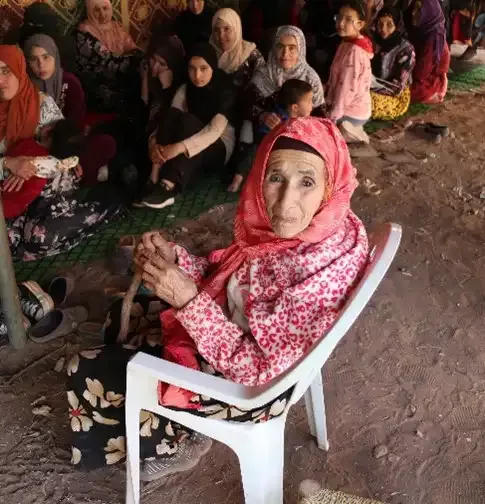 Nonprofit Elkhir supports women who were affected by the earthquake in Taddart, a village tucked away in the Middle Atlas.
Nonprofit Elkhir supports women who were affected by the earthquake in Taddart, a village tucked away in the Middle Atlas.
© Léa Lacheteau
To help the villagers of Taddart, which is at the heart of the Middle Atlas, and cut off, nonprofit Elkhir has set up a mobile listening center. Twice a month, a team of professionals comes to the village to offer women and children a listening ear, legal advice and psychological support. The nonprofit also helps women increase their financial independence by learning crafts such as embroidery, weaving and crochet. The aim is to create a cooperative to sell their creations. As well as giving women more independence, this project also contributes to the village’s economic development.
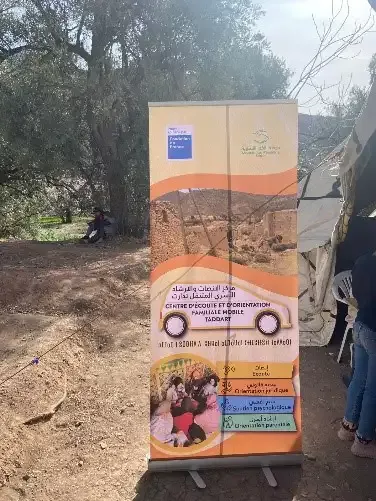 A poster of the listening center displayed by Elkhir. © Léa Lacheteau
A poster of the listening center displayed by Elkhir. © Léa Lacheteau
The nonprofit Enfance Handicapée helps those injured by providing medical equipment and meeting the needs for reeducation and rehabilitation, thanks to the care provided by the nonprofit’s professionals.
In Marrakech, ALCS (a nonprofit combating AIDS) supports more than 600 vulnerable people with practical help (food parcels and vouchers, hygiene kits, etc.), as well as psychosocial support, post-trauma monitoring and medical consultations and treatments.
Shelter for people affected by the disaster and support for rebuilding
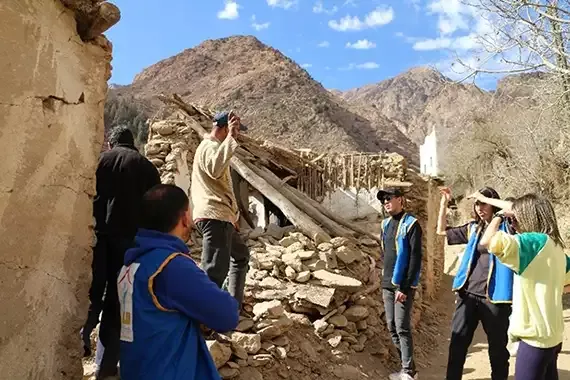 Teams from the Amane Foundation and Fondation de France in the villages destroyed by the earthquake. © Léa Lacheteau
Teams from the Amane Foundation and Fondation de France in the villages destroyed by the earthquake. © Léa Lacheteau
In the first weeks after the earthquake, Fondation de France deployed emergency measures to provide shelter for the victims, with tents of various sizes and accommodation containers. For example, Fondation de France supports Jood, a nonprofit very involved in housing issues, which installed 30 prefab houses and 30 sanitary facilities – including showers, basins and toilets – in the villages of Moulay Brahim, Talat N’Yaaqoub, Imgdal and Ljoukak. For its part, nonprofit Nissae Souss welcomes women and their children to accommodation centers and provides them with clothes, meals, toiletries, drugs, school supplies and psychological support.
However, these solutions are still only stop gaps. “Which is why we’re busy working with architects and engineers and finding solutions on how to reinforce and shore up houses that are not too badly damaged. That way, inhabitants can go back to their homes safely,” explains Karine Meaux, Head of Emergencies at Fondation de France. This is the case for the Fondation Architectes de l’Urgence (Emergency Architecture Foundation), which is rebuilding demolished housing and infrastructure. In particular, it is rehabilitating a boarding school for young girls in the town of Asni, with support from the Béatrice Schönberg Foundation. Around 50 young girls from the villages affected will be able to resume their studies. Other reconstruction projects include a crafts workshop for a women’s cooperative and a welcome center for toddlers, which offers childcare and activities for little ones in Moulay Brahim.
Maintaining access to education
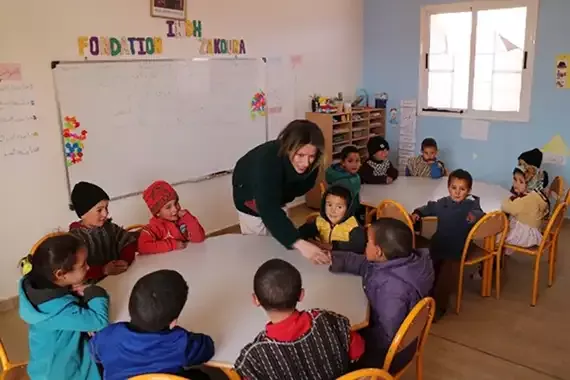 In Titane, a village located in the Taroudant mountains, nonprofit Tibu rehabilitated the school partially destroyed by the quake.
In Titane, a village located in the Taroudant mountains, nonprofit Tibu rehabilitated the school partially destroyed by the quake.
© Léa Lacheteau
The earthquake has led to an increase in early school leaving. More than 500 schools were destroyed. Nonprofit Al Jisr is fitting out nine modular structures in the province of Chichaoua for the children in this devastated region.
INSAF (the National Institute for Solidarity with Women in Distress), which has advocated for women and children for the past 20 years, has reinforced its support for vulnerable young girls by funding their school fees and providing grants to their parents. Thanks to Fondation de France, 150 young girls will be able to resume their studies and benefit from psychological and post-traumatic care.
In Titane, a village nestling in the Taroudant mountains, nonprofit Tibu has rehabilitated the school partially destroyed by the quake. It has also provided school supplies and IT equipment so that children can have proper access to education. The nonprofit has also rebuilt the playing field and launched a program, “Sports for Kids”, so that young people can play a sport, supervised by coaches, for an hour each day.
Contributing to economic recovery
In order to gradually return to normality, contributing to economic recovery is a key priority for Fondation de France. In particular, shops and agricultural infrastructure need to be rebuilt. For example, nonprofits AgriSud and Norsys encourage people with low income to set up agricultural projects that are fair, viable and ecological (rebuilding damaged infrastructure, supplying inputs, small equipment items, livestock, etc.).
In the Taroudant province, which was struck by the earthquake, a consortium of six Moroccan and French organizations led by Migrations & Développement are working together with local players to rebuild healthcare and education facilities and boost the recovery of devastated areas, especially by supporting local agriculture.
For its part, IECD Maroc, supported by Fondation de France and the AFD, helps young people access the labor market in a range of sectors such as construction, renewable energy, electromechanics and assistance for disabled people. Taking the form of a caravan, it offers workshops on business development. It also provides technical, financial and psychological support to business owners whose activities were affected by the quake.
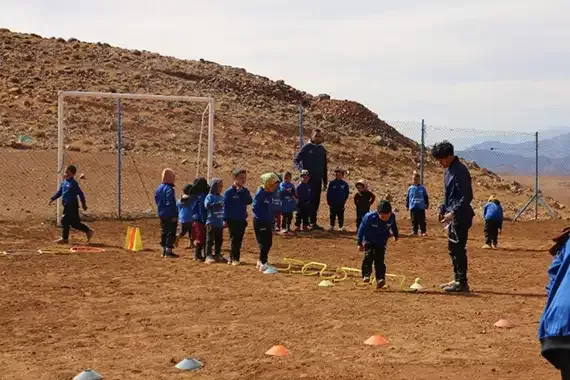 Playing field rebuilt by Tibu. © Léa Lacheteau
Playing field rebuilt by Tibu. © Léa Lacheteau

